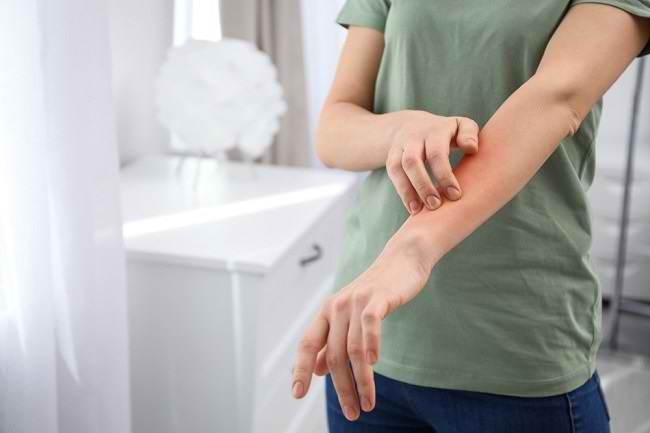Skin allergies can develop in minutes or gradually after several hours have passed. Although most allergic reactions are mild, serious allergic reactions can also occur suddenly. The causes can also vary, because it is to prevent skin allergies, it is important to recognize the triggers of allergies and avoid them.
In medical terms, skin allergies are called allergic contact dermatitis. Allergies can be triggered by several causes. The emergence of allergies is caused by exposure to allergens, which are foreign substances that are mistakenly considered dangerous by the immune system, so that if exposed can cause allergic reactions.

A person who has sensitive skin is very prone to allergies. Some signs that can be recognized include redness, rashes, itchy and swollen skin.
Causes of Skin Allergies
There are some things that can generally be cause and trigger allergic skin reactions, among others:
- Cosmetic products , such as facial makeup, lotion, deodorant, soap, shampoo, and hair dye.
- Cleaning products, such as floor cleaners, laundry detergents, disinfectants and detergents.
- Medicines applied to the skin, such as anti-itch creams or antibiotics.
- Accessories made of metal, for example nickel or gold.
- Plants, which can include leaves, stems, or pollen.
- Latex, that is the material used for rubber gloves, condoms and balloons.
- Insect spray.
- Perfume .
You also at greater risk of developing skin allergies if you have a skin condition called eczema (eczema), inflammation of the lower limbs due to impaired blood circulation, or itching in the intimate area.
An allergic reaction does not appear immediately when the body is first exposed to an allergen. At first exposure, the immune system will only remember it and then make antibodies as a reaction. If the body is exposed to the next allergic triggering agent, then an allergic reaction will occur. The process of forming an immune reaction against allergens requires at least 10 days.
If you already have allergies, within minutes, patients can directly experience symptoms of skin allergies when in contact with allergens. However, new symptoms can also occur 1-2 days after exposure to allergens. In some cases, allergies can cause fatal reactions or anaphylaxis.
Although it rarely happens, we still need to be aware of allergic reactions in the form of anaphylaxis. In addition to skin flushing, anaphylaxis can cause shortness of breath, abdominal cramps, sudden weakness, swelling in the throat and mouth, and loss of consciousness. If not treated immediately, anaphylaxis can cause death.
How to Deal with Skin Allergies
If you have skin allergies, find out the cause and avoid contact with allergens as much as possible. . In addition, there are some tips that can reduce the risk of skin allergies.
- Use calamine lotion or hydrocortisone cream
Both of these creams work to reduce itching. However, the use of drugs such as hydrocortisone creams needs to follow the doctor's recommendations. - Use loose and soft clothing
Tight clothing can make skin rashes worse. Therefore, when the body experiences itching in skin allergies, wear comfortable and loose clothing. - Take a shower with cold water
This method is useful to reduce rashes on the skin or can also use cold water compresses. After that, dry the skin with a clean towel then use a moisturizer. Avoid bathing or soaking in hot water, because it can worsen the symptoms of skin allergy. - Allergy test
To find out someone has an allergy to certain objects or foods, allergy testing is necessary. This test is done by giving exposure to various substances in a certain amount to see the body's reaction.
Skin allergy tests are usually done if the patient has a special medical condition, such as if there is eczema. Other conditions are if you feel itching or swelling and experience biduran or dermatitis that does not improve even after receiving treatment. In addition, allergy tests can also be done if we have a history of allergies to food, pollen, and drugs.
If you experience skin problems, it is advisable to check with a dermatologist. Avoid scratching the itchy rash because it can cause skin infections and hinder the healing process.
Label : Health
Comments
Post a Comment